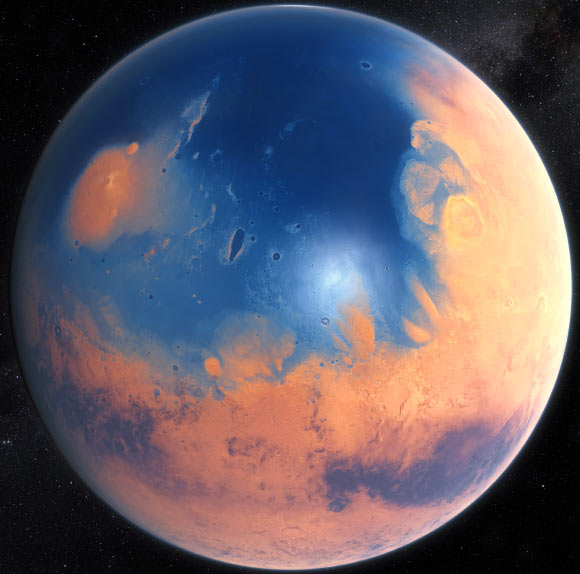An analysis of chromium isotopes in Martian meteorites suggests that approximately 4.5 billion years ago, there was enough water for the entire planet to be covered in a 300-m-deep global ocean.
The young Mars would have had enough water to cover its entire surface in a liquid layer about 300 m deep. Image credit: M. Kornmesser / ESO / N. Risinger, skysurvey.org.
“At this time, Mars was bombarded with asteroids filled with ice. It happened in the first 100 million years of the planet’s evolution,” said senior author Professor Martin Bizzarro, a researcher at the University of Copenhagen.
“Another interesting angle is that in addition to water, the icy asteroids also brought biologically relevant molecules such as amino acids to Mars.”
“Amino acids are used when DNA and RNA form bases that contain everything a cell needs.”
In their new study, Professor Bizzarro and colleagues found that the Martian ocean that covered the entire planet in water was at least 300 m deep.
“They may have been up to 1 km deep. In comparison, there is actually very little water on Earth,” Professor Bizzarro said.
“This happened within Mars’ first 100 million years.”
“After this period, something catastrophic happened for potential life on Earth.”
“It is believed that there was a gigantic collision between the Earth and another Mars-sized planet.”
“It was an energetic collision that formed the Earth-Moon system and, as the same time, wiped out all potential life on Earth.”
The authors analyzed chromium (54Cr) isotope variability in a total of 31 Martian meteorites, some of which were once part of Mars’ original crust.
“The whole secret is hiding in the way Mars’ surface has been created — and of which the meteorites were once a part — because it is a surface that does not move,” they said.
“On Earth it is opposite. The tectonic plates are in perpetual motion and recycled in the planet’s interior.”
“Plate tectonics on Earth erased all evidence of what happened in the first 500 million years of our planet’s history.”
“The plates constantly move and are recycled back and destroyed into the interior of our planet.”
“In contrast, Mars does not have plate tectonics such that planet’s surface preserves a record of the earliest history of the planet.”
The results were published in the journal Science Advances.
_____
Ke Zhu et al. 2022. Late delivery of exotic chromium to the crust of Mars by water-rich carbonaceous asteroids. Science Advances 8 (46); doi: 10.1126/sciadv.abp8415




